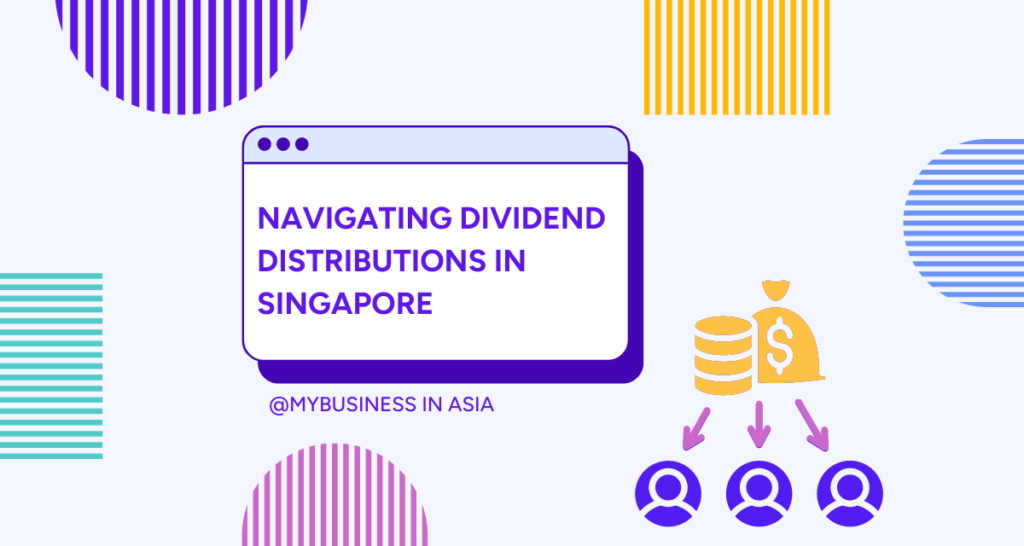
Dividend distribution plays a pivotal role in the investment landscape of Singapore, serving as a reliable source of income and wealth accumulation for investors. In the dynamic and ever-evolving financial market of Singapore, understanding the intricacies of dividend distribution is not just beneficial – It is essential for maximizing your returns and achieving financial success. All about Dividend distributions Singapore just below.
For investors in Singapore, dividends represent not just financial gain but also a form of financial security. In a world characterized by economic uncertainties, dividend distributions provide a steady stream of income, serving as a lifeline for those seeking financial stability both in the present and for the future.
That said, dividend investing isn’t just about receiving periodic payouts. It’s more than that. It’s about understanding the mechanisms, making informed decisions, and crafting a strategy that aligns with your financial goals.
As we delve into the intricacies of dividend distributions in Singapore, we will explore their significance, the unique advantages they offer in the Singaporean market, and the strategies that can be employed to harness their full potential.
It doesn’t matter whether you are a novice investor looking to make your mark in the world of dividends or an experienced market participant seeking to refine your strategies. This comprehensive guide will provide you with the essential tools and insights to navigate dividend distributions in the Singaporean market effectively.
 Understanding Dividend Distributions
Understanding Dividend Distributions
Dividend distributions are the financial rewards that companies bestow upon their shareholders as a gesture of gratitude for their investment and trust. These distributions represent a portion of the company’s earnings, shared periodically with those who hold its stock.
Essentially, they are the dividends of success, and they serve as a tangible testament to a company’s profitability and commitment to its shareholders.
Why Dividend Distributions Matter
For investors in Singapore and beyond, dividend distributions carry significant importance for the following compelling Reasons.
- Steady Income Stream: Dividends offer investors a dependable source of passive income. In a world of economic fluctuations, political uncertainties, and market volatility, this regular income can be a financial lifeline. It can help cover daily expenses, supplement other income sources, or be reinvested to accelerate wealth accumulation.
- Wealth Accumulation: Dividend distributions provide a unique opportunity for investors to accumulate wealth over time. By consistently reinvesting dividends into additional shares or other investments, the power of compounding can come into play, potentially leading to substantial capital growth.
- Stability in portfolios: Dividend-paying stocks often exhibit greater stability during market downturns compared to non-dividend-paying counterparts. This resilience can act as a stabilizing force in your investment portfolio, helping to mitigate losses during challenging economic times.
Dividend Distributions Singapore: Singapore’s Unique Landscape
Singapore’s stock market is a hub for dividend distributions due to its robust financial ecosystem, tax policies, and diverse multinational corporations listed on the Singapore Exchange (SGX). The Singaporean government’s tax benefits on dividend income make it attractive for investors. The efficient regulatory framework and culture of transparency make Singapore an ideal location for dividend-focused investments.
 Dividend distributions Singapore : Benefits of Dividend Investing in Singapore
Dividend distributions Singapore : Benefits of Dividend Investing in Singapore
One thing is certain – dividend investing is a time tested strategy that offers a range of advantages for investors. These benefits are especially appealing in the context of the Singaporean market. Here is why you should consider dividend investing in Singapore.
1. Passive Income Stream
One of the most compelling advantages of dividend investing is the steady stream of passive income it provides. Companies that distribute dividends typically do so on a regular basis, often quarterly or annually. For investors, this means a consistent flow of cash into their portfolios. This passive income can serve multiple purposes:
- Meeting Everyday Expenses: Dividend income can cover everyday expenses, making it a valuable source of financial support for individuals and families.
- Supplementing Retirement Income: Many investors use dividends as a crucial component of their retirement income strategy. This regular income can help maintain a comfortable lifestyle during retirement.
- Reinvestment: Investors can choose to reinvest their dividends back into the stock market, purchasing additional shares. This practice, known as dividend reinvestment, can accelerate wealth accumulation over time.
2. Potential for Capital Growth
Dividend investing doesn’t just provide income; it also has the potential to fuel capital growth. When companies consistently pay dividends, it often indicates financial health and stability. Such companies are likely to attract investors, leading to an increase in stock prices over time.
In Singapore’s vibrant market, dividend-paying stocks can be a smart choice for those looking to enjoy both income and capital appreciation. The stability of these stocks, combined with their growth potential, makes them a valuable addition to an investor’s portfolio.
3. Stability in Uncertain Times
Dividend-paying stocks often exhibit greater stability during market downturns, providing investors with a degree of protection. In uncertain economic times, investors may seek refuge in dividend stocks because of the reliability of their income streams.
In the Singaporean market, where economic conditions can be influenced by various global and regional factors, the stability offered by dividend investing is particularly valuable. It can help investors weather economic storms and maintain a sense of financial security.
4. Tax Advantages in Singapore
Singapore’s unique tax system offers significant benefits to dividend investors:
- Tax-Exempt Status: Singapore-based companies enjoy tax exemptions on a portion of their income. This, in turn, can result in higher dividend payouts to shareholders.
- One-Tier Tax System: Singapore operates a one-tier tax system, which means that companies are taxed on their income, and dividends paid to shareholders are not taxed a second time. This tax efficiency can boost the overall returns for dividend investors.
- Tax Credits for Foreign Dividends: Singapore also provides tax credits for foreign dividends received by Singaporean residents. This further encourages diversification into international dividend-paying stocks.
 Types of Dividend Distributions in Singapore
Types of Dividend Distributions in Singapore
In the Singaporean stock market, companies employ various types of dividend distributions to reward their shareholders. Understanding these different dividend types is crucial for investors seeking to make informed decisions about their investments.
1. Regular Cash Dividends
Regular cash dividends are the most common type of dividend distribution. They represent a portion of a company’s earnings that is paid out to shareholders in the form of cash. These dividends are typically distributed on a predictable schedule, often quarterly or annually.
Implications for Singaporean Investors
Steady Income: Regular cash dividends provide investors in Singapore with a reliable and consistent source of income, which can be particularly valuable for covering daily expenses or supplementing other sources of income.
Income Tax Considerations: In Singapore, cash dividends are generally not taxed at the shareholder level, thanks to the country’s one-tier tax system. This tax efficiency can enhance the attractiveness of regular cash dividends for investors.
2. Special Dividends
Special dividends are periodic payments made by a company that exceeds its typical dividend payout. These distributions are often declared when a company experiences exceptionally strong financial performance or when it has excess cash reserves beyond what is needed for regular operations.
Implications for Singaporean Investors
Surprise Windfall: Special dividends can provide Singaporean investors with unexpected windfalls, adding an extra layer of financial benefit.
Impact on Stock Price: The announcement of a special dividend can lead to increased investor interest and potentially drive up the stock price. Investors should consider the potential impact on capital gains.
- Scrip Dividends
Scrip dividends, also known as dividend reinvestment plans (DRIPs), offer shareholders the option to receive additional shares in lieu of cash dividends. Instead of receiving cash, shareholders receive a certificate or a statement of ownership representing additional company shares.
Implications for Singaporean Investors
Wealth Accumulation: Scrip dividends allow investors to acquire more shares without spending additional capital. This can be an effective strategy for wealth accumulation over the long term.
Tax-Efficient: In Singapore, the tax implications of scrip dividends can be favorable, as capital gains are generally not taxed. However, when you eventually sell the additional shares, capital gains tax may apply.
Considerations for Singaporean Investors
Singaporean investors should consider their financial goals and tax circumstances when choosing dividend types. Diversification helps balance income and growth objectives. Tax efficiency is crucial, considering Singapore’s tax policies. Company financial health and personal financial goals should guide the choice of dividend type.
 Strategies for Maximizing Dividend Returns in Singapore
Strategies for Maximizing Dividend Returns in Singapore
Investors in Singapore have a range of strategies at their disposal to maximize their dividend returns. Let’s explore some of the most effective approaches, tailored to the unique dynamics of the Singaporean market.
1. Dividend Growth Investing
Dividend growth investing involves selecting stocks from companies with a history of consistently increasing their dividend payments over time. This strategy focuses on the potential for both steady income growth and capital appreciation.
2. High Dividend Yield Stocks
High dividend yield stocks are shares in companies that offer dividend payments at a relatively high rate compared to their stock price. This strategy is geared toward maximizing current income.
3. Dividend Reinvestment Plans (DRIPs)
Dividend reinvestment plans (DRIPs) offer investors the option to reinvest their dividends back into additional shares of the same company. This approach can accelerate wealth accumulation over time.
4. Sector Diversification
Sector diversification involves spreading investments across various industries and sectors. This strategy helps mitigate risks associated with economic or sector-specific downturns.
 Tax Considerations for Singaporean Investors
Tax Considerations for Singaporean Investors
Understanding the tax implications of dividend income is crucial for Singaporean investors as it can significantly impact the overall returns on investments. Fortunately, Singapore offers a favorable tax environment for investors, with several tax-efficient strategies and structures.
1. Tax Implications of Dividend Income
In Singapore, dividend income is generally subject to a tax called the “one-tier corporate tax system.” Under this system, companies pay taxes on their profits, and dividends distributed to shareholders are not taxed again at the individual level.
This means that Singaporean investors typically do not pay taxes on the dividends they receive. The absence of double taxation on dividends means that the full dividend amount can be reinvested or used for personal expenses without deductions for taxes.
2. Tax Credits for Foreign Dividends
Singapore provides tax credits for foreign dividends received by Singaporean residents through the Foreign Tax Credit (FTC) scheme. This scheme is particularly beneficial for investors who hold foreign dividend-paying stocks in their portfolios.
Under the FTC scheme, Singaporean investors can claim tax credits for foreign taxes paid on foreign dividends. This reduces their overall tax liability and ensures that they are not taxed twice on the same income.
3. Supplementary Retirement Scheme (SRS)
The Supplementary Retirement Scheme (SRS) is a tax-efficient savings program in Singapore designed to encourage long-term retirement savings. It allows individuals to contribute a portion of their income to an SRS account, which can then be used for investments, including dividend-paying stocks.
 4. Real Estate Investment Trusts (REITs)
4. Real Estate Investment Trusts (REITs)
Real Estate Investment Trusts (REITs) are popular among Singaporean investors for their income-generating potential. REITs are required to distribute at least 90% of their taxable income to shareholders, making them a reliable source of dividend income.
REITs are tax-transparent entities, which means that dividends received by investors from REITs are generally not subject to corporate tax. This leads to higher dividend yields for investors.
5. Tax-Efficient Portfolio Management
Singaporean investors can optimize their portfolios for tax efficiency by employing strategies such as:
- Capital Gains vs. Dividends: Understanding the tax implications of capital gains versus dividends can help investors choose investments that align with their tax objectives.
- Tax-Loss Harvesting: Offsetting capital gains with capital losses can reduce overall tax liability.
- Holding Periods: Long-term investments are often subject to lower capital gains tax rates than short-term investments, so investors may consider holding assets for longer periods.
In conclusion, dividend distributions Singapore offer an excellent avenue for investors in Singapore to build wealth and achieve their financial objectives. By understanding the unique landscape of dividend investing in Singapore, assessing your risk tolerance, and implementing effective strategies, you can navigate dividend distributions successfully and work toward maximizing your returns.
If you are unsure of dividend stocks to invest in, or simply need guidance on how to maximize your dividend returns in Singapore, feel free to reach out to us at MBiA and we will be happy to enlighten you on everything regarding dividend Distributions in Singapore!